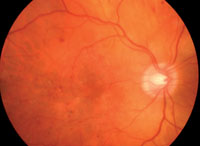 |
| Doxycycline can suppress the neuroinflammation of diabetic retinopathy. |
“To our knowledge, this is the first observation suggesting a link between a low-dose oral anti-inflammatory agent and subclinical improvement in inner retinal function,” the authors wrote in JAMA Ophthalmology online. “Oral doxycycline may be a promising therapeutic strategy targeting the inflammatory component of DR.”
Non-proliferative DR is the stage of retinopathy that affects most people with diabetes. Although vascular endothelial growth factor (VEGF) inhibitors may slow progression, they are not widely used and require multiple intraocular injections.
“The significance of the work is the potential ability to treat [DR] with a safe, FDA-approved oral agent and to avoid the necessity for intraocular injections,” says lead author Thomas Gardner, MD, professor of ophthalmology and visual sciences at the University of Michigan Medical School, Ann Arbor.
In this randomized, double-masked clinical trial, 30 participants with either type 1 or 2 diabetes mellitus who had at least one eye affected by nonproliferative DR or non-high-risk proliferative DR were given either low-dose (50mg) doxycycline monohydrate or placebo for 24 months.
At the end of the trial, mean foveal sensitivity (as measured by frequency-doubling perimetry) had increased in the doxycycline group (+1.8 dB) and decreased in the placebo group (-1.9 dB). This difference remained significant after adjusting for duration of diabetes. There were no differences between groups regarding other visual function and anatomical outcomes.
Large-scale trials are needed to confirm the findings, the authors say, so doxycycline won’t likely be seen in clinical practice just yet.
Scott IU, Jackson GR, Quillen DA, et al. Effect of doxycycline vs placebo on retinal function and diabetic retinopathy progression in patients with severe nonproliferative or non-high-risk proliferative diabetic retinopathy: a randomized clinical trial. JAMA Ophthalmol. 2014 Mar 6. [Epub ahead of print]

